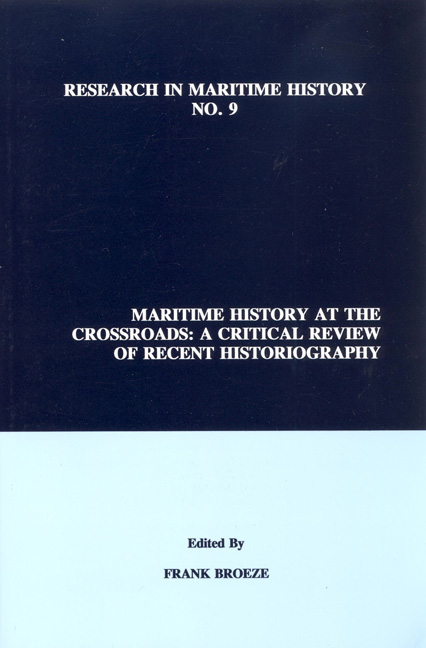Book contents
- Frontmatter
- Contents
- About the Editor
- Introduction
- Contributors
- “Maritime History in Australia”
- “The Enterprising Canadians: An Assessment of Canadian Maritime History since 1975”
- “The Historiography of Maritime China since c. 1975”
- “Danish Maritime History, 1976-1992: A Review”
- “German Maritime Historical Research since 1970: A Critical Survey”
- “The Maritime Historiography of Greece in Recent Decades”
- “Ibero-American Maritime History: Recent Advances in Research, 1975-1994”
- “Indian Maritime Historiography: West Coast Merchants in a Globalizing Economy”
- “Recent Developments in the Historiography of Maritime History in the Netherlands”
- “The Ottoman Empire: Recent Research on Shipping and Shipbuilding in the Sixteenth to Nineteenth Centuries”
- “The Progress of Maritime History in Spain since 1975”
- “Oceanic Historiography: The American Dimension”
“The Maritime Historiography of Greece in Recent Decades”
from Contributors
- Frontmatter
- Contents
- About the Editor
- Introduction
- Contributors
- “Maritime History in Australia”
- “The Enterprising Canadians: An Assessment of Canadian Maritime History since 1975”
- “The Historiography of Maritime China since c. 1975”
- “Danish Maritime History, 1976-1992: A Review”
- “German Maritime Historical Research since 1970: A Critical Survey”
- “The Maritime Historiography of Greece in Recent Decades”
- “Ibero-American Maritime History: Recent Advances in Research, 1975-1994”
- “Indian Maritime Historiography: West Coast Merchants in a Globalizing Economy”
- “Recent Developments in the Historiography of Maritime History in the Netherlands”
- “The Ottoman Empire: Recent Research on Shipping and Shipbuilding in the Sixteenth to Nineteenth Centuries”
- “The Progress of Maritime History in Spain since 1975”
- “Oceanic Historiography: The American Dimension”
Summary
Greek maritime history of the last two centuries has suffered stoically under the burden of its glorious past of a few thousand years ago. Like a child of famous parents, modern Greek maritime history has never seemed as important as its ancient forebears. Too many contemporary maritime historians consider it necessary to remind readers of King Minos or Ulysses before dealing with the maritime affairs of the modern Greek state. Until a few years ago discussions of bulk carriers or tankers, or an analysis of modern Greek shipping over the last twenty years, always started with Themistocles’ triremes of the fifth century BC.
Ancestor-worship, national pride and biological explanations abound in maritime historical studies. “The great power that the Greek race has enjoyed at sea throughout history has enabled it to perform magnificent exploits,” wrote Andreas Lemos in 1976.
Thus, with their Navy, the Greeks drove the Phoenicians out of the Aegean, in later periods they became the dominant sea power from the Sea of Azov to the Pillars of Hercules and they created outposts of Hellenism in Asia Minor, Sicily and Lower Italy; they imposed themselves to the Roman conquerors; they turned the Eastern Roman State into a Byzantine Empire; they survived through the long period of Turkish rule; they fought the glorious struggle for independence in 1821 which led to the liberation of Greece; and now they proudly carry the Greek flag over the oceans on one of the biggest merchant fleets in the world.
Dr. Matheos Los continued along the same lines in 1987:
Today the Greek flag flies at every point of the seven seas, announcing to all people the Greek maritime genius and the seafaring tradition upheld by this people…The exodus of the Greeks to the sea is known to have originated in the third millennium BC in Crete where the first pre-Hellenic civilization was found - the so-called Minoan. Dr. Matheos Los continued along the same lines in 1987: Today the Greek flag flies at every point of the seven seas, announcing to all people the Greek maritime genius and the seafaring tradition upheld by this people…The exodus of the Greeks to the sea is known to have originated in the third millennium BC in Crete where the first pre-Hellenic civilization was found - the so-called Minoan.
- Type
- Chapter
- Information
- Maritime History at the CrossroadsA Critical Review of Recent Historiography, pp. 135 - 150Publisher: Liverpool University PressPrint publication year: 1995



